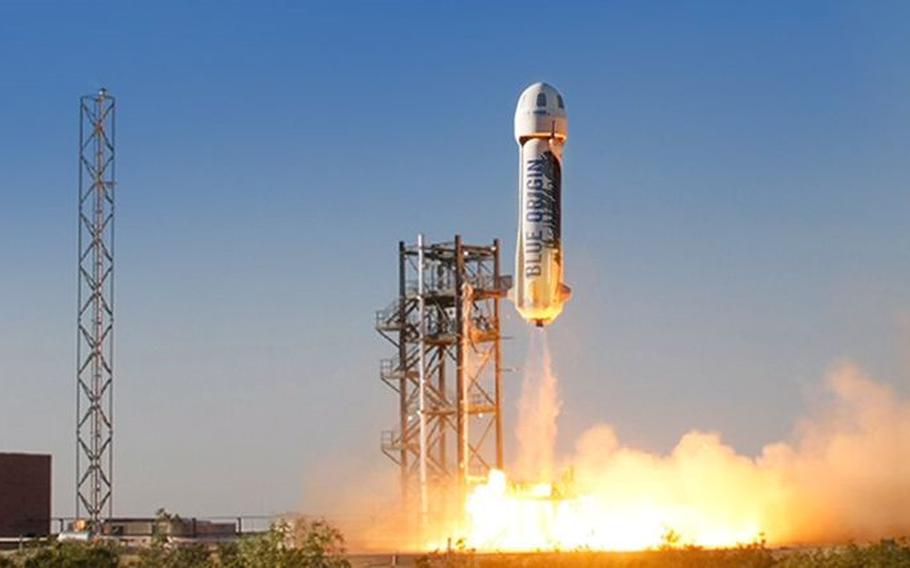How much would you pay to go to space with Jeff Bezos?
For at least one person, the answer is $28 million, an astounding sum that won a live auction Saturday for a seat on the first human spaceflight for Bezos’s Blue Origin space company. (Bezos owns The Washington Post.)
The identity of the winner won’t be made public for a couple of weeks, the company said, leading to speculation over who the mysterious bidder could be. A tech entrepreneur? A wealthy foreigner? Or maybe a want-to-be-astronaut backed by a country’s government who would be the first from his or her homeland to go to space?
Whoever it is, the person will get to strap into New Shepard’s capsule alongside Bezos, his brother Mark and a fourth, yet-to-be-named crew member, for a rollicking ride to the edge of space that lasts all of 10 minutes. The flight is scheduled for July 20, the anniversary of the Apollo 11 moon landing, from the company’s launch site in West Texas.
Blue Origin promises that the trip will be profound — allowing the passengers to see the Earth from a distance, view the dark sky above and marvel at the curvature of the Earth. And it will pave the way for more flights to come, as the company begins to ramp up commercial service, routinely flying paying customers out of the atmosphere.
In all, nearly 7,600 bidders from 159 countries participated in the auction, driving the price to a level well beyond what some company officials had anticipated. Blue Origin flies its New Shepard capsule to an altitude of about 65 miles, where passengers can then unbuckle from their seats and experience about four minutes of weightlessness. The $28 million is about half the cost of what some private citizens are paying for a trip to the International Space Station, where they’ll live and work for about a week before flying home on SpaceX’s Dragon spacecraft.
The money raised in Blue Origin’s auction is to go to support the company’s foundation, Club for the Future, which encourages future generations to pursue careers in science, technology, engineering and math to “help invent the future of life in space.”
The auction comes as several companies are working toward flying a host of private astronauts. Blue Origin’s chief rival in the suborbital space tourism market, Richard Branson’s Virgin Galactic, recently completed its third human spaceflight mission.
Branson was supposed to allow one more test flight before he strapped into the company’s space plane, known as SpaceShipTwo, for his flight. But he has been desperately eager to get to space for years, and the company has left the door open to allowing him to fly earlier in an attempt to compete with Bezos.
Elon Musk’s SpaceX, which flies a much more powerful rocket, the Falcon 9, has several private astronaut missions on the manifest as well. But unlike Virgin Galactic and Blue Origin, which shoot their spacecraft on ballistic trajectories that fly almost straight up before falling back down, SpaceX sends its Dragon spacecraft to orbit around the Earth at speeds of 17,500 mph.
It has several trips scheduled to send passengers to the International Space Station at a cost of $55 million per seat.
Blue Origin officials had said they expected bidders to pay a premium for the seat. It’s the company’s first human spaceflight mission, after 15 test flights without people on board. And flying alongside Bezos may have been an attractive prospect for some. The company has not said what it will charge the public for seats once tickets go on sale. Virgin Galactic had charged $250,000 before discontinuing sales. When they come back online later this year, the company has said they will be more expensive. It hasn’t named a price, but analysts said they expected it to be about $500,000.
After the auction, Blue Origin said it would begin contacting the runners up to sign them up for future flights as well.

(Facebook)